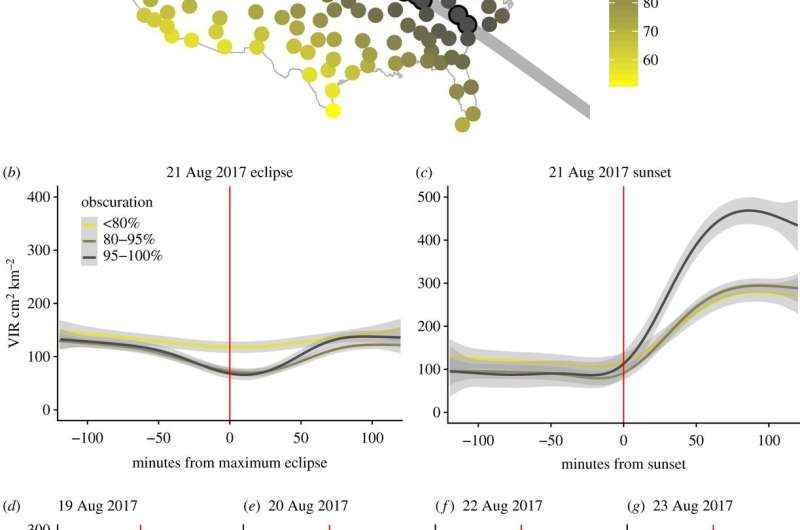November 14, 2018 report
How birds and insects reacted to the solar eclipse

A team of researchers with Cornell University and the University of Oxford has found that birds and insects reacted in some surprising ways to the 2017 U.S. total solar eclipse. In their paper published in the journal Biology Letters, the group describes their study of birds and insects during the solar eclipse using Doppler radar data and what they found.
In this new effort, the researchers sought to better understand how creatures such as birds and insects respond to atypical periods of darkness such as a total solar eclipse. To that end, they gained access to data from 143 weather stations that had captured the activities of multiple birds and insects in different parts of the United States during the August 21, 2017, solar eclipse. They note that due to the short lifespan of birds and insects, none of them would ever have experienced an eclipse before. Thus, the sudden darkness would present an unexpected change in their environment.
In looking at the Doppler radar data and analyzing it using machine-learning programs, the researchers were able to establish movements of flying species from near the ground to approximately three miles up in the air. They report seeing unusual activity up to 50 minutes before the eclipse reached totality—many of the flying creatures began returning to ground or other perches. This was particularly so for those flying at high altitudes. The researchers suggest that it seems reasonable to attribute the change in activity to the creatures responding as they would to a storm—seeking shelter is a natural response to weather conditions that can prove deadly for small flying creatures.
The researchers also found something they thought was strange: A group of flyers, likely birds, changed their behavior just before totality, suddenly taking flight and quickly settling back to their perches once again. They suggest the reason was because the birds had become confused, at one moment thinking that normal darkness had arrived, only to discover that it was something else.
The researchers are planning to collect even more data the next time around—in 2024, a total solar eclipse will once again pass over major parts of the continental United States. They hope more precise radar data might be able to differentiate between animals.
More information: Cecilia Nilsson et al. Aeroecology of a solar eclipse, Biology Letters (2018). DOI: 10.1098/rsbl.2018.0485
Journal information: Biology Letters
© 2018 Science X Network



















